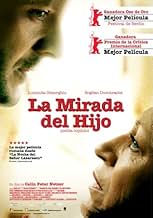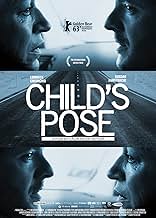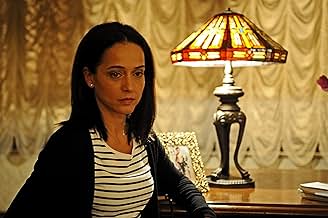Ajouter une intrigue dans votre langueAfter the terrible news of a fatal car accident involving her son, a desperate mother will do anything in her power to set her child free.After the terrible news of a fatal car accident involving her son, a desperate mother will do anything in her power to set her child free.After the terrible news of a fatal car accident involving her son, a desperate mother will do anything in her power to set her child free.
- Réalisation
- Scénario
- Casting principal
- Récompenses
- 13 victoires et 8 nominations au total
- Leontina Vaduva, the Soprano
- (as Leontina Väduva)
Avis à la une
Reading bad reviews upfront, was afraid about getting bored from being too long, or dizzy from excessive use of hand held camera. Happy to report none of them apply. Instead, last frame was finding me quite surprised about how fast it was finished.
This film reminds me very much of "A separation" of Farhadi. They touched me in the same way, although the stories were different. That is because both stories are just recipients for emotions.
And in the end, this movie is full of emotions, human, universal, atemporal emotions. And that is what makes this film great.
As many of the good Romanian films in this period Calin Peter Netzer's movie can be seen and interpreted at multiple layers. One of them is composed of the social realities of Romania more than two decades after the fall of the communism. Class disparities are more obvious than in other places and contrast with the forced (and false) egalitarianism that dominated the Romanian society for most of the second half of the 20th century. The introductory scenes build for the viewer the context of the relations of the mid-upper class where the main heroes belong, with bourgeois occupations and family crisis, stylish social events and opera master classes. The obsessive relationship between the dominant mother and the spoiled son who seems to behave like an ingrate brute defines the second layer, the one of the personal relations between the characters. When the road accident that turns the world of the heroes upside down happens, the heroes will be obliged to make contact with the other Romania, the one of the pauper country people, with course manners but maybe with more character and moral strength. The system of relations and corruption is immediately put in motion by the mother, trying to protect her son and make him avoid the consequences of his behavior - a social comment about today's Romania which does not go lost neither for the Romanian nor for the foreign viewer. While this part is more clearly cut, there is no moral judgment made on the rest of the relations, and this is a smart choice made by the director.
The rest is left to the actors and they are simply said wonderful. Luminita Gheorghiu as the possessive mother and Bogdan Dumitrache as the traumatized son who makes all the wrong moves at the wrong moments in order to cut-off the invisible umbilical cord play one of the most meaningful and highly charged mother-son relationships that I have seen lately. Most of the actors in the supporting cast give sincere and expressive performances, which I would rather describe not as acting but as living their roles. A few memorable scenes (the master class at the beginning and the final scene of the confrontation with the family of the kid killed in the accident) may live in the memory of the viewers even longer than the rest of the film. Dealing with a subject that could have easily turned into melodrama or soap opera Pozitia Copilului succeeds to make a sharp social comment that works well with the more universal story of a suffocating love which is touched by miscommunication and tragedy.
The story: Cornelia, a middle-aged high society architect, is informed by her sister-in-law that her son Barbu has killed a child in a traffic accident, and both immediately proceed to the police station where he is being held for questioning. They barge into the interrogation, all the while phoning useful contacts, and manage to change Barbu's statement, after which they take him back to his parent's house. In the following days, Cornelia develops various schemes to get Barbu off the hook of a trial, receiving unexpected support from Barbu's wife (or girl-friend) Carmen, even though they thoroughly hate each other.
The accident itself is not the main story. It serves as a backdrop for highlighting the blatant disregard of the rich for the poor, the pervasiveness of corruption in Romanian society, and to illustrate how possessive and self-serving Cornelia is. Most screen time is devoted to Barbu's 'cutting of the post-natal umbilical cord', his sometimes desperate, mostly half-hearted attempts to gain independence from his overprotective mother.
The strength of the film lies in the ambiguity of its characters, foremost Luminiţa Gheorghiu's Cornelia, which she brilliantly portrays as a vicious self-obsessed diva totally immune to the plight of others, and who is still thoroughly devoted to her son. The viewer is torn between disgust and pity for her, for instance, when stopping in front of the killed child's parents, she exclaims 'Damn, it's one of the better houses', indicating that her only interest is to buy the parents' consent to revoke their claim against Barbu. Yet when sitting with them at a table, she so tearfully describes her plight that one cannot help but feel moved. Barbu, on the other hand, is a hypochondriac and coward, who for most of the time cannot admit to what he has done, but when he argues with Cornelia to back off, one cannot help but wonder how he could have turned out any other way, given the obsessive nature of his mother.
The real icing on the cake, however, is a brief scene between Cornelia and the principal witness to the accident, whom she hopes to bribe. Vlad Ivanov (of 'Doctor Bebe' fame in '4 months 3 weeks 2 days') once again plays a cynical ruthless character who confronts the female protagonist with the fact that the situation forces her to do precisely what he wants - well, maybe not quite. This scene is the best of any Romanian film I have seen in the past five years and merits the price of the ticket alone.
What may elude a non-Romanian viewer of this film is that the title itself is also ambiguous, 'poziţia copilului' being a wordplay with 'poziţia corpului', which means 'position of the body', a term used in police reports to describe the location of an accident victim when found. This recalls 'poliţist, adjectiv' by Corneliu Porumboiu, which in 2009 won the Un Certain Regard Jury Prize in Cannes. That title is also a wordplay, and Netzer shares many stylistic resemblances with Porumboiu.
If the film isn't perfect, then because of Netzer's tendency for emotional overkill; he rides his protagonist's credibility a little too hard sometimes, as in his debut feature 'Maria' (2003). However, that film is still alive in my memory precisely because the misery of the main character was so all-encompassing, so he may be using exaggeration as an artistic tool. 'Child's Pose' is a little too obviously geared towards festival expectations rather than domestic audiences - Romanians tend to prefer their social criticism with a large dosage of humor, as in all-time favorite 'Filantropica' (2002) by Nae Caranfil. But since the acting is mostly nothing short of brilliant, these calculations do not harm the film's artistic value and social message.
Cornelia Keneres, portrayed with masterful understatement and restraint by Luminita Gheorghiu, is a haughty, emotionally aloof woman who, nevertheless, just can't seem to cut the cords that bind her to her only child, Barbu (Bogdan Dumitrache). Barbu, of course, resents his mother's endless interference in his life, an interference that is only intensified when he tragically runs over and kills a 14-year-old boy who's crossing a freeway on which Barbu is driving recklessly. Because Barbu seems devoid of initiative in trying to make things right with both the legal system and the family of the victim, Cornelia launches into full Mama Bear mode, lavishing large sums of money in her wake as she attempts to clean up the life-shattering mess her son has made for himself and others. Is Cornelia now paying the consequences for treating her son as a child for so long? Is that why he now finds himself unable to step up to the plate and accept responsibility for his actions as a mature adult should?
Filmed in a wholly realistic and naturalistic style, "Child's Pose" is about as far from melodrama as a movie about life-and-death issues could possibly be. There are no grand speeches, no emotional outbursts springing from the tragic events of the story. The movie makes us feel as if we are eavesdropping on these people as they go about the business of trying to make sense of an entirely senseless situation. As such, we get to witness first-hand the agony and grief, the bitterness and guilt, and the thirst for redemption that the various characters are going through.
As embodied by the extraordinary Gheorghiu, Cornelia becomes a fascinatingly complex character made up of any number of inconsistencies and contradictions. For instance, she's constantly deriding Barbu for not being a man, for making a mess of his life and not fulfilling the hopes she and his father had for him when he was younger. Yet, it is her very insistence on meddling, mothering him and stepping in to solve all his problems that is the key factor in making him this way. And is she truly moved by the concerns of the grieving parties or is she motivated more by the fate of her own son and the guilt she might be feeling for the way she raised him?
Flawlessly written and directed by Cailin Peter Netzer (with Razvan Radulescu as co-writer), the movie ends on a powerful note, one that hints at the barest possibility for reconciliation and redemption for the individuals involved. It's a largely wordless moment, heartbreakingly silent and obliquely shot, and it is a moment that will linger long in the memory of anyone who sees it.
Le saviez-vous
- AnecdotesOfficial submission of Romania for the 'Best Foreign Language Film' category of the 86th Academy Awards in 2014.
- Citations
Cornelia Keneres: What did I do wrong?
Barbu: Never mind now. I'm putting this on the table. You can say yes or no. You either let me call you when I feel like it, or it's nothing. And a suggestion. If it's hard, find a substitute. A dog, a lover, a hobby. People your age visit the Pyramids.
Cornelia Keneres: Other people my age have a normal relationship with their child. Parents find their fulfillment in their children. Everything they failed to accomplish, they achieve through their children.
Barbu: So we're agreed.
Meilleurs choix
- How long is Child's Pose?Alimenté par Alexa
Détails
- Date de sortie
- Pays d’origine
- Sites officiels
- Langues
- Aussi connu sous le nom de
- La postura del hijo
- Lieux de tournage
- Sociétés de production
- Voir plus de crédits d'entreprise sur IMDbPro
Box-office
- Budget
- 850 000 € (estimé)
- Montant brut aux États-Unis et au Canada
- 97 170 $US
- Week-end de sortie aux États-Unis et au Canada
- 12 955 $US
- 23 févr. 2014
- Montant brut mondial
- 994 126 $US
- Durée1 heure 52 minutes
- Couleur
- Mixage
- Rapport de forme
- 2.35 : 1
Contribuer à cette page





























